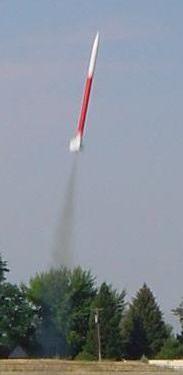| Manufacturer: | Rocket Vision |

(Contributed - by Frank Ross)
Brief:
Design service let's you choose tube length, payload section, choice of 3 fin
designs, nylon chute recovery system with Kevlar® lines & shock cord &
Nomex® chute protector.
Construction:
The Rocket Vision starter-level design service lets you choose from several
options of components to build your own "Rugged Rocket" design. The
choices are somewhat limited: choose your payload section (or omit a payload),
choose from 3 airframe lengths (9+", 13", or 16"), and choose
G-10 fins from 3 designs (either 3, 4, or 6 fins can be ordered). There is but
one choice for the nose cone. You can also opt to add a recovery kit which
includes a nylon chute, Nomex® chute protector, and Kevlar® shroud lines and
shock cord. Finally, you can also choose from two stock decal sheets if you
want to add some graphics to your finished rocket.
I chose to build the largest rocket possible by selecting the 5.25" payload and the 16" airframe. For fins I selected the 3-fin diamond design. I added the recovery kit and decal sheet no. 2 to complete my kit.

Note that the Rocket Vision design service does not include instructions. There are, however, highly detailed assembly guides (including detailed instructions, with photos) available on the Rocket Vision web pages for all of their rocket kits. Using these guides I was able to easily construct my design.
 I first used epoxy
(30-minute, although 5-minute would be better) to secure the motor mount tube
into the airframe tube. While this set I prepped the G10 fins by rounding the
root edge and tail edge for aerodynamics. Next, I test-fit the fins into the
airframe fin slots and found that I needed to sand the slots and fin root edge
slightly so that the fins easily fit into the slots without too much force. I
again used 30 minute epoxy to affix the fins and later for fillets.
I first used epoxy
(30-minute, although 5-minute would be better) to secure the motor mount tube
into the airframe tube. While this set I prepped the G10 fins by rounding the
root edge and tail edge for aerodynamics. Next, I test-fit the fins into the
airframe fin slots and found that I needed to sand the slots and fin root edge
slightly so that the fins easily fit into the slots without too much force. I
again used 30 minute epoxy to affix the fins and later for fillets.
I used the online guide for the Spitfire kit to construct the payload section. This amounted to securing the tube coupler and bulkhead to the payload section using epoxy. The nose cone is secured to the payload section with a single screw - the payload section comes pre-drilled for the attachment screw.
The final step for the rocket construction is the addition of the plastic launch lug - I again used 30-minute epoxy to attach and fillet the lug. The parachute, Nomex® protector, and Kevlar® shock cord attachment instructions are described for each kit and are all the same, and quite straight-forward.
Overall, the construction was a snap, the on-line guides are an excellent resource. I suppose it would be nice if some kind of general construction instructions were included with the kit however. The rocket is definitely "rugged" if not a little heavy for its size.
Finishing:
Finishing the rocket was a breeze. I first sanded the entire rocket, especially
the nose cone which has a fairly rough finish. I primed with Krylon sandable
primer, sanded, primed again, and finish sanded. I chose red and white Krylon
paint with a Sandhawk-like paint scheme. The rocket finished beautifully, and
there was no worries about any tube seams or spiral!
Construction Rating: 4 out of 5
 Flight:
Flight:
I've only flown the rocket once so far (stay tuned for updates). I chose a
D13-5 24mm Aerotech RMS motor for the launch. The delay was just an educated
guess, I did not simulate the launch on RockSim as I did not have time to add
the custom components (would be nice if Rocket Vision made a RockSim database
similar to PML!). The choice turned out to be very good. The flight was smooth
to roughly 600 feet, with ejection at apogee. The rocket is quite stable, given
its length, but needs a bit more power to get some altitude due to its weight.
I will try some more power on the next flights pending simulation.
Recovery:
Unfortunately, recovery was a little fast as a couple of shroud lines came
undone (better go back to my Boy Scout handbook and review my knots). The
landing was rough but as advertised the rocket being "rugged" easily
withstood the impact. The Nomex® did and excellent job protecting the chute
though, and it's ready to go again.
Flight Rating: 4 out of 5
Summary:
PROS: Fun to design online, excellent component quality, durable, very easy to
finish. CONS: Pricey for a smaller rocket, lack of component choices. I am very
much looking forward to Rocket Vision's next stage of online kit design.
Overall Rating: 4 out of 5
Sponsored Ads
 |
 |
![Rocket Visions [Explicit] Rocket Visions [Explicit]](https://m.media-amazon.com/images/I/51eSFum+f0L._SL500_.jpg)
![ROCKET VISION [Explicit] ROCKET VISION [Explicit]](https://m.media-amazon.com/images/I/511IYbQhXkL._SL500_.jpg)









